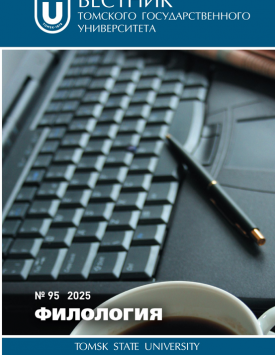"A Truthful Soul": Feliks Volkhovsky's autobiographical short story in Sibirskaya Gazeta
The article examines the short story "Pravdivaya Dusha" [A Truthful Soul] by the revolutionary populist Feliks Volkhovsky (1845/1846-1914), published in Sibirskaya Gazeta (1881-1888) in 1886. The study focuses on the autobiographical nature of the short story, which Volkhovsky revealed in one of his letters to the American journalist and researcher George Kennan. The story is Volkhovsky's full-fledged literary interpretation of his biography and childhood memories. In the story, the author interprets the "first revolutionary act" that occurred in 1852-1853 - an attack on the grandfather on whose estate he witnessed the punishment of one of the serfs. The plots, narrative, specific details, motifs, and imagery are almost entirely aligned with Volkhovsky's memoirs, Excerpts of a Human Life, published in Sovremennik in 1911- 1912. In the story, Volkhovsky demonstrates the awakening of a desire in a person to fight against evil and social injustice, numerous examples of which the protagonist Kolya observed at the Zhurcheevskaya mill, and Volkhovsky himself, at the age of seven, witnessed in the "spider's kingdom" of his grandfather's estate in the village of Moisevka, Poltava Province. Like the story, the memoirs are divided into episodes and lack a cohesive plot. All actions are "strung together" by a single motif - the desire to show the awakening in a person's soul of a sense of injustice and rejection of the existing social order, where one person oppresses another. The article compares the images of the "spider's" (memoirs) and "Samotugin's" (story) "kingdoms". Despite the autobiographical nature and the fact that the "episode" that became the basis of the story took place in the 1850s, the narrative seamlessly "grounds" itself in the Siberian reality of the 1880s. This is primarily due to the pre-reform way of life in the region, which Volkhovsky consistently highlighted in his works: despite the abolition of serfdom, the oppression of peasants by "district predators" and "pompous officials" continued in Siberia. The story "A Truthful Soul" in Sibirskaya Gazeta becomes part of a series of earlier works published by Volkhovsky under the pseudonym Ranunculus, depicting the life of the "little man" in Siberia. However, the image is completely inverted - unlike his predecessors, Kolya finds the strength to fight back. The ending itself and the theses articulated by Volkhovsky take on a more concrete meaning in the memoirs: Volkhovsky criticizes not the actions of a specific individual but the social order itself, explicitly outlining the social subtext, which was impossible in "A Truthful Soul": Sibirskaya Gazeta, as a provincial publication of the 1880s, was subject to preliminary censorship. The author declares no conflicts of interests.
Keywords
Feliks Volkhovsky, "A Truthful Soul", "Excerpts of a Human Life", "Sibirskaya Gazeta" (1881-1888), "Sovremennik" (1911-1915), short story, autobiography, memoirs, George KennanAuthors
| Name | Organization | |
| Mazurov Alexandr E. | Tomsk State University | rumatamonteg@gmail.com |
References
 Sibirskaya Gazeta | Vestnik Tomskogo gosudarstvennogo universiteta. Filologiya – Tomsk State University Journal of Philology. 2025. № 95. DOI: 10.17223/19986645/95/13" width="275" height="355"/>
Sibirskaya Gazeta | Vestnik Tomskogo gosudarstvennogo universiteta. Filologiya – Tomsk State University Journal of Philology. 2025. № 95. DOI: 10.17223/19986645/95/13" width="275" height="355"/>
"A Truthful Soul": Feliks Volkhovsky's autobiographical short story in Sibirskaya Gazeta | Vestnik Tomskogo gosudarstvennogo universiteta. Filologiya – Tomsk State University Journal of Philology. 2025. № 95. DOI: 10.17223/19986645/95/13
